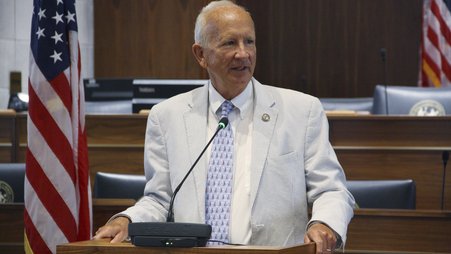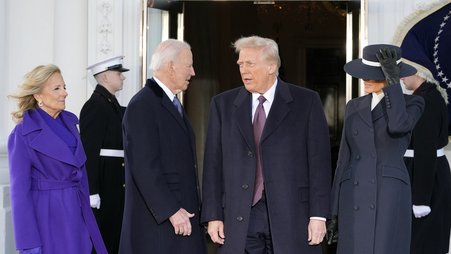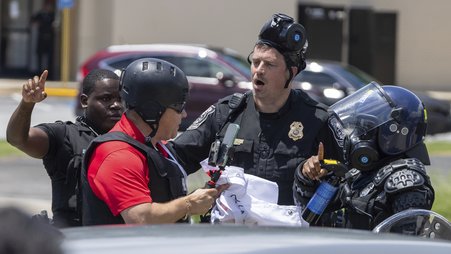When it comes to press freedom, last week was a fitting close to President Joe Biden’s term. On Wednesday, he emphasized the importance of the free press in his farewell address. On Thursday, two journalists who demanded answers about the Israel-Gaza war were removed — one forcibly — from his secretary of state’s news conference. On Friday, the Supreme Court upheld the TikTok ban he supported despite knowing full well the “data privacy” concerns lawmakers cited were a pretext for censorship.
With “friends” of press freedom like Biden, who needs enemies? The president who loved to proclaim that “journalism is not a crime” ignored warnings from press freedom advocates and handed his proudly anti-press successor a road map to criminalize it.
Here are the three themes that will define Biden’s press freedom legacy.
Anti-press prosecutions
Biden received warning after warning about the dangers of prosecuting WikiLeaks founder Julian Assange under the Espionage Act for actions investigative journalists take every day — talking to sources, obtaining secret documents, and publishing them. Nevertheless, he persisted — extracting a guilty plea from Assange in exchange for his freedom, normalizing prosecutions of routine newsgathering.
Biden officials might have taken issue with Assange’s methods or believed he wasn’t a “journalist,” but it doesn’t matter — there is nothing in the Espionage Act that would restrict Donald Trump from employing identical legal theories against any publisher of government secrets he dislikes, including conventional journalists.
And then there’s the prosecution of Florida journalist Tim Burke under computer crime laws. That did Trump a huge favor because the Espionage Act only applies to government secrets. But, as Biden knows, Trump also has oligarchs to protect!
The Computer Fraud and Abuse Act, under the interpretation of Biden’s Department of Justice, will help him do so by criminalizing journalists’ use of the internet to find secrets the powerful don’t want published — even if the powerful accidentally post them on publicly available websites.
Not only that, the government, according to Biden’s prosecutors, can label reporting materials like notes and stories in progress as contraband and permanently seize them, stopping journalists’ stories in their tracks.
Only Biden knows if he finally regrets arming Trump with this impressive anti-press arsenal, but that won’t help Trump’s victims.
Sacrificing the Constitution for ‘national security’
Justice Hugo Black famously wrote in the Pentagon Papers case that “the word ‘security’ is a broad, vague generality whose contours should not be invoked to abrogate the fundamental law embodied in the First Amendment.” Black’s probably rolling over in his grave.
It is undisputed that the purported national security concerns underlying the TikTok ban are entirely hypothetical. There is no evidence China is using TikTok to spy on Americans. And why would it, when, absent a comprehensive data privacy law, the information it could conceivably get from TikTok is widely available from plenty of other sources? But there is evidence that lawmakers’ real motivation for the ban was to stop young people from using TikTok to criticize the Israel-Gaza war.

President Joe Biden greets Saudi Crown Prince Mohammed bin Salman with a fist bump in 2022. Later that year Biden’s administration declared Salman immune from liability for his suspected role in the murder of journalist Jamal Khashoggi.
And yet, the Supreme Court, at the Biden administration’s urging, authorized censorship of not just one newspaper but a whole platform that millions of Americans, including journalists, use to communicate. Biden seemed surprised by his political stunt actually becoming law, promising that the ban won’t go into effect immediately. And Trump, who once supported the ban, now opposes it.
That means it’s entirely possible that, at the end of the day, all that will come out of this is a Supreme Court ruling weakening free speech protections just in time for Trump’s return. That and an opportunity for Trump to position himself as restoring the First Amendment rights of America’s youth. Well done, Joe.
Incidentally, the Supreme Court’s TikTok opinion cited China’s law requiring companies from there (like TikTok’s parent company, ByteDance) to cooperate with Chinese surveillance. But it didn’t mention that the U.S. passed a law last year, with Biden’s full support, letting our own government force companies to secretly spy for it.
Biden again ignored repeated warnings that the law could easily be abused by Trump and whoever comes after him to spy on journalists.
For someone so critical of Chinese surveillance and censorship, Biden sure likes copying directly from their playbook.
Turning a blind eye to Gaza
We don’t mean to put journalists on a pedestal. Every civilian death in the Israel-Gaza war is tragic, and press freedom violations are far from the only wrongs by its ally that the Biden administration ignored.
That said, the world relies on journalists for credible information about the war, and Israel has killed a record number of reporters, many of them in seemingly targeted attacks. It has refused to allow international outlets to enter Gaza and retaliated against those that are already there. Journalists report death threats followed by bombs.
The U.S. would surely be quick to condemn the same conduct by an adversary. But in Israel’s case, Biden officials expressed “concern” and spewed other meaningless rhetoric while doing absolutely nothing to hold Israel accountable for its use of U.S. weapons and funds to attack the press. It’s no wonder that journalists, frustrated with all the doublespeak, breach decorum at news conferences.
Yes, Biden’s done some good things for the press. His DOJ passed guidelines that limited subpoenas and surveillance of journalists. Trump will likely repeal those — an outcome Biden could’ve prevented by advocating for the PRESS Act, the bipartisan bill to protect journalist-source confidentiality that he never vocally supported. The Biden DOJ also warned against arresting journalists at protests, including after they’re dispersed.
Biden’s administration helped free journalists Evan Gershkovich and Alsu Kurmasheva from Russia, where they were held on sham charges. There were other highlights, like restrictions on spyware (which Trump may also reverse).
But those accomplishments pale in comparison to his failures. He has not only damaged the press at home, he’s undermined U.S. standing to oppose attacks on the press abroad.
We know things will likely get worse under Trump, but it’ll take a lot to make us miss Biden and his empty platitudes.
Also read our article on three threats to press freedom we’re watching during Trump’s second term.





